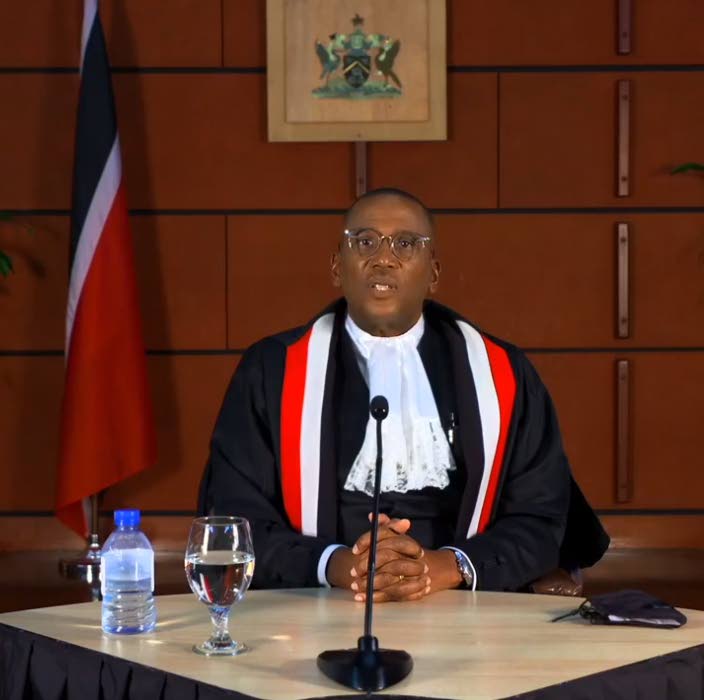Appeal Court reserves decision on bail-for-murder appeal

CHIEF Justice Ivor Archie and Appeal Court judges have reserved their ruling in the appeal of a court’s dismissal of a constitutional claim brought by a former murder accused who wants a declaration that anyone charged with the capital offence should have the opportunity to apply for bail.
After close to five hours of submissions from attorneys for Akilii Charles, the Law Association, and the Attorney General, the Chief Justice said the court will have to give careful consideration to the positions advanced in the appeal but will endeavour to deliver its ruling before the Christmas break in December.
In March, Justice Joan Charles dismissed Akilii Charles’s constitutional claim.
Refusing to declare section five of the Bail Act, which makes murder a non-bailable offence, Justice Charles said the former murder accused failed to establish that the legislation directly interfered with judicial proceedings, or breached the doctrine of the separation of powers, to make it unconstitutional.
She had been asked to strike down the specific portion of the Bail Act to allow people charged with murder to apply for bail.
In her decision, Charles said she could not depart from previous decisions of the Privy Council on separation of powers, nor did she agree that the effect of the legislation removed all judicial input on the issue of granting, or refusing, bail for murder.
She pointed out that judges of the High Court, in the past, did not grant bail for murder, either at common law or by statute.
Charles said the classification of murder was a task for the legislature, and Parliament alone should determine if there should be bail for the capital offence.
Charles spent nine years on remand before the murder charge against him was dismissed in May 2019 by Chief Magistrate Maria Busby-Earle Caddle who upheld a no-case submission, agreeing with his attorneys there was insufficient evidence for the matter to proceed to trial.
But, Akilii Charles’s lead counsel, Anand Ramlogan, SC, argued the court had the discretion to grant bail even for crimes considered heinous.
He said a judicial custom to not grant bail for murder could not be crystalised in law.
“It is an unlawful, self-imposed fetter on the court’s jurisdiction where the liberty of the subject is at stake.”
Ramlogan also said the doctrine of separation of powers was a structured mechanism to protect and preserve fundamental rights, but while there will be an overlap, there were certain areas that remained exclusive.
One of these was the ability of the Judiciary to manage its affairs, he said, adding that the discretion to grant bail was a judicial function.
“I do not think Parliament can take away a court’s power to grant bail. This is a core judicial function.”
He said the legislature could provide guidance.
“The Judiciary should have undisturbed discretion to consider bail.” He asked the judges to consider the reality of the criminal justice system and a ten-year wait by an accused to go to trial. He said constitutionally, lengthy incarceration can be considered unreasonable.
“We cannot lose touch with the reality on the ground.
“The harsh reality is you have to tell a man you are presumed innocent but must stay in jail for ten years…But don’t worry you will get a fair trial. The system is eroding.”
He suggested stipulations in the exercise of discretion to grant bail, including the 120-day no bail condition under the Bail Act or electronic monitoring.
“Bail is not designed to punish but to secure attendance in court.”
Ramlogan said Trinidad and Tobago did not yet have the classification of degrees of culpability for murder so it was important for the Judiciary to have the power to consider granting bail.
Senior Counsel Douglas Mendes, who advanced the Law Association’s position on the question of bail for murder, said there was no reason why a judicial function should be taken away for serious offences such as murder which still carries the mandatory death penalty.
“It is impossible to defend such a law that takes away judicial discretion. A blanket prohibition to bail cannot be justified even more so where there is a presumption of innocence.”
“The administration of justice is being eroded. That is not how the law should work. It is not reasonably justifiable.”
In opposition to the joint position taken by Charles and the Law Association, lead counsel for the Attorney General, Senior Counsel Fyard Hosein agreed that the law was in need of reform, but said to do so required constitutional change.
He said this was a decision for the Parliament. Hosein also urged the judges to consider the reality of the criminal situation and the rationale behind the prohibition of bail for murder.
“We have a real problem out there with respect to murders and guns. Legislative intervention is necessary. We need to look at what is happening in society.”
Hosein also argued that section 5(1) of the Bail Act was saved law under section 6 of the Constitution and it was a well-established practice for people accused of murder to be refused bail.
Ramlogan, in his submissions on the savings law clause, argued that it could not be held that section 5(1) of the Bail Act was an existing law that was saved by section 6 of the Constitution and was therefore immune from challenge on the ground that it violated the rights contained in sections 4 and 5 of the Constitution.
Also representing Charles were Jayanti Lutchmedial, Ganesh Saroop. Appearing with Hosein for the AG were Diane Katwaroo and Tenille Ramkissoon, while Kiel Tacklalsingh, Kavita Roop-Boodoo and Aaron Mahabir appeared for the Law Association.

Comments
"Appeal Court reserves decision on bail-for-murder appeal"